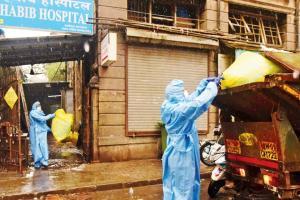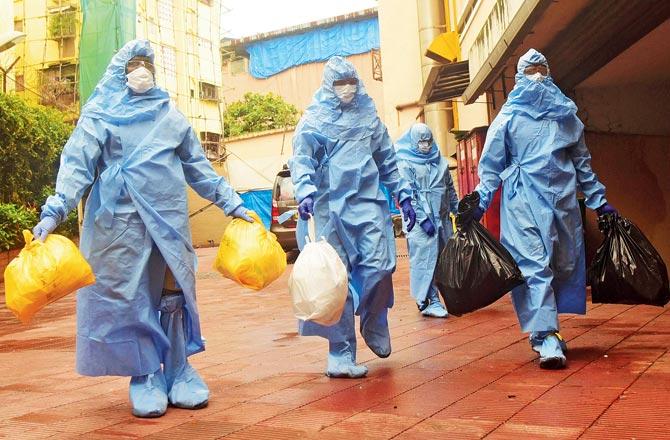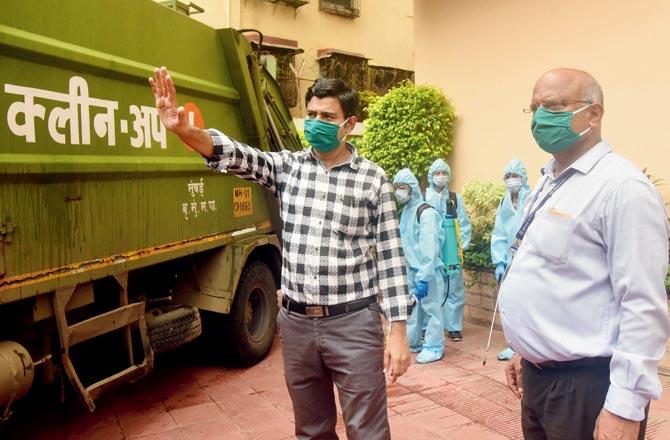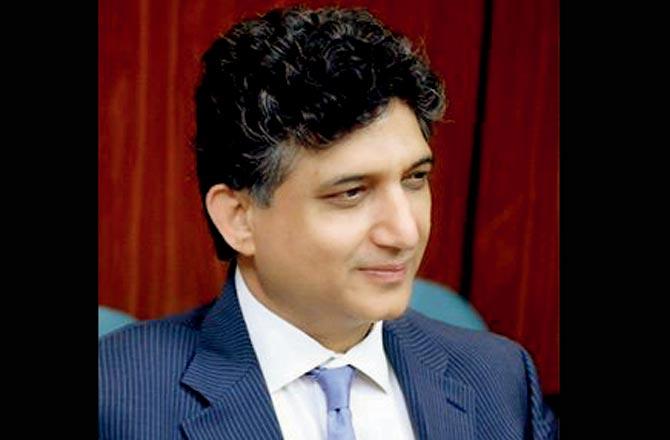With excess biomedical waste being generated from hospitals and labs, experts weigh in on how to ensure efficient disposal without risking contamination

BMC conservation staff collect biomedical waste from Habib Hospital in Dongri. Pics/Suresh Karkera
Every week, Francis Fernandes, co-founder of Xpert Property Management Services Pvt Ltd., a facility management agency, trains his 14-member staff, employed at a private hospital in Andheri, in hand hygiene, respiratory etiquette, social distancing and use of appropriate personal protective equipment. Along with this, he ensures that they remember to toss all items contaminated with blood or body fluids of COVID-19 patients in yellow coloured, non-chlorinated plastic bags. "They are not supposed to pick up contaminated items with their hands, even if they have gloves on. There's a special holder allocated to lift items used by a COVID-19 patient," he says.
ADVERTISEMENT
The Coronavirus pandemic has thrown up multiple new challenges, and the monumental increase in biomedical waste is a major one among them. Apart from deploying their own municipal staff, several states have now started outsourcing the job of collection and disposal of COVID-19 biowaste to third parties, in order to meet the increasing load.

While all biomedical waste is collected in yellow bags, black bags are allocated for regular solid waste
Based on figures recorded by an app launched by the Central Pollution Control Body (CPCB), about 60 tonnes of COVID-19 waste is generated daily. The app is currently being used in 27 states. "Given that this is a high-risk job, workers involved in segregation and collection have a mortal fear of handling the infected material. But we are ensuring that they are adequately armoured and cautious," says Fernandes.
Chitrangad Kulkarni, assistant engineer, Solid Waste Management Department for B Ward, says they have designated a separate vehicle to take biomedical waste from hospitals, dedicated COVID-19 centres and containment zones to the Deonar facility. At the facility, the waste is sprayed with disinfectant and incinerated immediately. All other municipal solid waste is collected in black bags and taken to another section at Deonar, where they are treated with sodium hypochlorite solution before being discarded. "I have deployed 14 people to collect the waste. Our workers have been trying to educate households on waste segregation, because we need to ensure that people who are at home are disposing of their biowaste properly to ensure that they do not end up passing it to anyone, including garbage collectors."

(L) Jitendra Patil, sub engineer (SWM) for B ward, and Ranjit Mayekar, assistant head supervisor, monitor the collection
Gopal Bhange, deputy engineer (environment) at Kalyan-Dombivli Municipal Corporation (KDMC), admits that disposal of biowaste generated by households is proving to be a big challenge. Although they have distributed yellow bags to everyone, they often find biomedical waste mixed with regular waste. Typically, yellow bags contain used syringes, medicines, used masks, gloves, urine bags, body fluid or blood-soaked tissues. "Firstly, there's a tight window of 24 to 48 hours to treat the waste, so if you're mixing it with other solid waste, you end up putting more burden on the incinerators," he says. According to figures revealed by KDMC, the civic body collected an average of 373 kg of COVID-19 waste per day last month.
Presently, some of the key guidelines include, mandatory labelling of all biomedical waste generated during treatment as COVID-19 waste, use of dedicated trolleys and collection bins in COVID-19 isolation wards, daily disinfection of the (inner and outer) surfaces of containers/bins/trolleys used for storage of COVID-19 waste with one per cent sodium hypochlorite solution and storing of used masks and gloves generated from home quarantine in a paper bag for a minimum of 72 hours, prior to disposal.

Dr Gurpreet Sandhu, president of Council for Healthcare and Pharma
Dr Gurpreet Sandhu is the president of Council for Healthcare and Pharma (CHP). Headquartered in Delhi, the global think-tank advocates the development of sustainable healthcare systems around the world by engaging with governments and stakeholders, in order to usher in innovative policies. "Unlike normal biowaste, which is mostly dry with 60 per cent components needing incineration, COVID-19 waste needs 100 per cent incineration. While biomedical waste by a normal patient is about 250-500 gm per day, a COVID-19 patient generates almost 10-15 kg of waste, including the waste of doctors, nurses and the sanitary workers who attend to them," he says. The problems are many, including the paucity of incineration plants, even in metro cities, he adds. "While finances are
always an issue, the shortage of manpower willing to 'get their hands dirty' on the ground is a constant challenge." In addition to this, Sandhu says it has been difficult to continuously monitor biowaste coming from temporary health facilities, home quarantine and even crematoriums. Incidents of masks, syringes and PPEs lying around in crematoriums are fairly common.
Having said that, he believes India's biomedical rules are fairly robust. In fact, the past few months have seen guidelines on the matter being periodically revised to meet new challenges. For instance, the inclusion of households in Healthcare Facilities (HCF), under the new guidelines. This was not covered in the Biomedical Waste Management Rules, 2016. "In another example, HCFs have even been directed to disinfect sewage discharged at its locations, which was not the case earlier." The CPCB has also launched a COVID-19 Biomedical Waste Tracking App to regulate and manage the COVID-19 related waste making it mandatory for all testing laboratories, waste generators and disposal facilities to upload real-time data related to COVID waste.

Francis Fernandes runs a facility management co.
Ashish Jain, founder and director of Indian Pollution Control Association, India's first CPCB-registered non-government organisation for Plastic Waste Management, says the problem is with implementation. According to him, since the Coronavirus outbreak, biowaste generation has increased by 300 per cent. "This is because every family is using masks and gloves and are cautious about hygiene. Earlier, the percentage of biowaste generated by families was 0.01 per cent, which is negligible. We need to monitor households more vigorously."
Given that some COVID-related equipment such as PPE is made of non-biodegradable material, Sandhu thinks it's important that hospitals and clinics invest in recycling technologies for a more environmentally-compatible biowaste disposal process.
Anoop Lawrence, operations head at Global Hospitals, remembers how in the initial months of the outbreak, many hospitals were compelled to use disposable linens, bedsheets and even cutlery, because the workforce was scared of handling contaminated items. "This was contributing to the quantum of hazardous waste. And naturally, the charges levied by outsourcing agencies were exorbitant, because they had other overhead costs. So, where our average cost for basic biomedical waste disposal earlier was R60,000 a month, it increased to R3 lakh." It's only in May, when
there was more awareness regarding the disease and its spread that the hospital decided to discontinue the practice and devise ingenious ways to reuse and recycle material. "Basically, it's about applying effective infection-control practices, by ensuring that the cleaning and sanitisation process is in place. That has helped us significantly bring costs and waste down. Previously, we had around 35 COVID-19 patients, today it's 85. If we hadn't controlled the biowaste generation, the volume would have been humongous."
373kg
The avg COVID waste collected per day by KDMC last month
Catch up on all the latest Mumbai news, crime news, current affairs, and a complete guide from food to things to do and events across Mumbai. Also download the new mid-day Android and iOS apps to get latest updates.
Mid-Day is now on Telegram. Click here to join our channel (@middayinfomedialtd) and stay updated with the latest news
 Subscribe today by clicking the link and stay updated with the latest news!" Click here!
Subscribe today by clicking the link and stay updated with the latest news!" Click here!






